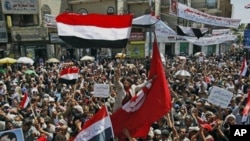Yemeni police opened fire on protesters in the capital Sana'a Tuesday, wounding at least 65 people who were demonstrating for an end to President Ali Abdullah Saleh's 32-year rule. Medical officials said many of the injured were in serious condition.
Riot police and security agents in civilian clothes fired live rounds and tear gas as they tried to prevent people from joining thousands of protesters who have camped out for weeks in front of Sana'a University.
The army stormed the campus hours after thousands of inmates rioted at the capital's Central Prison, taking a dozen guards hostage and calling for Mr. Saleh to step down. Yemeni rights groups said at least two prisoners were killed and 60 people wounded as guards fought to control the situation. The unrest at the facility began late Monday, when prisoners demanding reforms announced they were joining the country's anti-government protest movement.
Meanwhile, activists calling for the Yemeni president's resignation rallied across the country on Tuesday. For the first time since protests began almost a month ago, a large demonstration calling for the fall of the government took place in Dhamar province, a ruling party stronghold just south of the capital. Some of the president's key tribal allies, a number of whom are high-level government officials, come from Dhamar.
Tens of thousands took to the streets in southern Ibb province, calling on the government to bring to justice those responsible for a deadly attack there Sunday that killed one person and injured 53 others. Protesters also marched in the southern port city of Aden.
The government stepped up security in Sana'a on Tuesday, deploying military vehicles and extra troops.
As the anti-government protests spread, Yemeni Foreign Minister Abu Bakr al-Qirbi Tuesday appealed to rich Gulf countries for $6 billion in additional aid to help plug a widening budget gap. Qirbi blamed the growing unrest on poor economic conditions. Some 40 percent of Yemen's 23 million people live on $2 a day or less and a third face chronic hunger.
Protesters are demanding greater participation in a government largely led by Mr. Saleh's closest allies. They say they are frustrated by rampant corruption and soaring unemployment, which is at 35 percent or higher.
Mr. Saleh called for national dialogue during a meeting on Monday, but opposition leaders quickly rejected the offer. The president has previously stated that he plans to remain in office until his term ends in 2013.
.
Some information for this report was provided by AP, AFP and Reuters.




